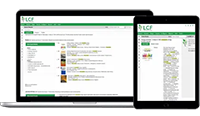KM and Curiosity: Is Asking Questions the Key to Limitless Knowledge?

Stan Garfield
My editor at Lucidea, Sarah Nichols, recently suggested the topic of this post. She wrote:
I recently watched the PBS documentary by Ken Burns on Leonardo da Vinci. One of his biographers, Charles Nicholl, remarked, “It’s not just that Leonardo knew an awful lot, it’s that he found out an awful lot. The way he found out was by asking questions. Why is that happening? How does it happen? What is the quality of that thing, or person, or emotion? He’s posing questions and looking for answers.” I wonder if this statement is a thought-starter for a post?
Indeed it was!
Ten Thoughts on Questioning
I found many quotes from prominent thinkers on the value of asking questions, including:
- A prudent question is one-half of wisdom. – Francis Bacon
- Good questions outrank easy answers. – Paul Samuelson.
- The art and science of asking questions is the source of all knowledge. – Thomas Berger
- One who never asks either knows everything or nothing. – Malcolm Forbes
- The master key of knowledge is, indeed, a persistent and frequent questioning. – Peter Abelard
- Never be too big to ask questions, never know too much to learn something new. – Og Mandino
- The people who don’t ask questions remain clueless throughout their lives. – Neil deGrasse Tyson
- The wise man doesn’t give the right answers, he poses the right questions. – Claude Levi-Strauss
- Asking the right questions takes as much skill as giving the right answers. – Robert Half
- I don’t pretend we have all the answers. But the questions are certainly worth thinking about. – Arthur Clarke
Children are great at asking questions, including endless rounds of “why?” However, as we get older, we get worse at doing this. An example is the reluctance, particularly among men, to stop and ask for directions when lost.
There is also a widespread aversion to asking questions in public forums. In my article Why won’t people ask questions in the open? I identified five reasons for this:
- I’m embarrassed.
- I don’t want to appear ignorant.
- I should know the answer.
- No one else needs to know that I had to ask.
- I don’t want to bother figuring out what to do.
I countered those with three benefits of asking openly:
- It will allow a wide range of answers offered by a variety of respondents, including those previously unknown to the person asking the question.
- It will allow others to benefit from seeing the question and the answers.
- It will provide a public record, which can later be searched for, linked to, and reused.
Ten Benefits of Asking
Asking questions has many benefits. The first five fit into the SIRCL acronym for the benefits of starting a KM program. Asking questions achieves the following:
- Suggests Sharing by prompting others to share what they know
- Initiates Innovation by getting people thinking of possibilities
- Results in Reuse when the answers are applied
- Catalyzes Collaboration by connecting those asking and answering
- Leads to Learning as a result of thinking up the questions and pondering the answers
- Gets answers
- Finds resources and help
- Solves problems
- Exploits expertise and experience of others
- Saves time that would have been spent searching or doing things the hard way or the wrong way
Ten Ways to Use Questions and Answers
- Eliciting knowledge: Get knowledge flowing through a series of structured queries. This can be captured for reuse, but it is also valuable in connecting people for future knowledge flow.
- Pushing action: Follow up repeatedly until the desired action is taken. A recent example is when I asked a friend when he was going to resume blogging after a long hiatus, and he said that my asking might get him to do so.
- Engaging people: Instead of subjecting a team to a long, boring presentation, have the team prepare questions for the would-be presenter and convert the session into an interactive one. Instead of sitting back and multitasking while the presenter drones on, they will have to be on their toes and participate, and the two-way exchange might be more valuable than the one-way presentation.,
- Nudging communities: As a community leader, when I see that a question has not received any replies, I reply to it and ask if anyone can respond. This always works, although sometimes I have to nudge more than once.
- Anticipating questions: If the same questions are asked repeatedly, post the answers in a FAQ list, and the next time, just point to the answer in the list. For meetings, to prevent the inevitable question, “Will the slides be made available,” distribute them in advance.
- Starting discussions: Ask questions to stimulate discussions in meetings, conferences, Knowledge Cafés, and online.
- Breaking the ice: Use conversation starter questions to help people get to know each other. This can be done at meetings, both virtual and in-person, and in online discussions. For meetings and conferences with meals, assign people to sit with those they don’t already know well. On each table, place a bowl with slips of paper containing questions that everyone at the table should take turns answering. These should include both fun topics and deeper ones.
- Managing change: Instead of telling people what is going to change, ask them questions about what changes they would most like to see. Then implement as many of those changes as possible.
- Surveying users: Use surveys to ask questions to identify current challenges and needs, compile a list of resources and their usefulness, and solicit feedback and suggestions. Then take action based on the results.
- Getting satisfaction: Ask for a refund, discount, replacement, or remedial service. You never know what is possible to receive unless you ask. A recent example is when I asked Amazon if I could return a product that was past the deadline for returns. I was granted an exception, and I was able to get a full refund.
Two Suggestions for Eliciting Questions (and One Exception to the Rule)
1. Kickstarting
To get people to ask questions, set an example. In meetings or conferences, ask the first question, and others will likely follow your lead. In online discussions, prime the pump by asking questions and privately asking a few other respected community members to do the same. Take steps to ensure that all questions receive timely and helpful answers so that others will take note and be more likely to ask their own.
2. Directing
If you send a question to a large distribution list, pose it to a large group in a meeting, or post it to a community, it may not receive any answers. People will assume that someone else will answer it, or they may be afraid of answering in the open for fear of being wrong. You may need to send the question privately and separately to one or more people who are likely to be able to supply answers. Upon receiving your private message, they will take it more seriously and will not be concerned that others will see their reply. If the answers you receive are valuable, you can post them back into the community, either anonymously or using the name of the responder if they agree.
An Exception to the Rule
In the early days of online communities, there was an expectation that you would search the discussion archives first before asking a question. If you failed to do so and posted a question that was previously answered, you might be admonished to search first.
In general, I don’t think people asking questions should be discouraged from doing so; it’s hard enough to get people to post, so slapping them on the wrist is a bad idea.
The exception is when people ask questions they could have answered for themselves with just a tiny bit of effort. Doing so would have spared others from having to endure an onslaught of redundant and trivial replies. An example is asking if a platform like Facebook or Instagram is down. This can be quickly checked by going to another platform, e.g., X (formerly Twitter).
Insights from Experts
Does Your Organization Have an Asking Problem? by Nancy Dixon
Knowledge sharing begins with a request, not with a solution. No matter how much knowledge is presented at conferences, held in databases, or emailed to colleagues, knowledge won’t be reused unless a team has a need—something they are struggling with.
Managers sometimes tell me that people in their organization have a problem with sharing knowledge; but more often than not, people aren’t “asking.” The organization has an asking problem, not a sharing problem. When people ask, the sharing problem becomes moot.
How organizations talk about “asking” is critical. When company officials say to professionals, “Don’t be afraid to ask for help,” their words actually work against asking. Asking for “help” denotes helplessness. No competent professional wants that image attached to his or her performance. What professionals do need is to be able to tap into organizational knowledge that is growing and changing – to tap into what others are learning from their ongoing experience. I have labeled this step “scanning,” which connotes an active seeking for something of value.
To Get People Talking, Try Asking the Right Questions by Nancy Settle-Murphy
“What are your views?” versus “What’s the one aspect of this change you’re most excited about and one aspect you’re most concerned about?” If people meet your question with silence, own responsibility for the possible confusion, then pause and rephrase it: “Judging from the silence, I think that the way I worded that question may have been unclear.” Pause. “Let me phrase it another way….” Chances are, someone will chime in.
Ask questions that energize and excite people. Compare “What steps should we take to achieve our goals?” to “A genie has suddenly appeared and promised to grant you three wishes. What are your three wishes, and why?” Yes, this means you need to script questions in advance. Prepare more questions than you think you need, in case one or two fall flat. Open-ended questions usually have the potential to be more engaging than close-ended questions.
Design questions that will make it especially inviting for even the quietest people to participate. For example, instead of commenting how quiet Anna has been, try latching onto something unique about her experience that she will likely want to share, given the chance. Example: “Anna, can you compare and contrast your experiences when working in China with Jim’s? I remember how tough things were there for a while until you got the hang of it.”
Appreciative Inquiry
Appreciative inquiry is asking questions that strengthen a system’s capacity to apprehend, anticipate, and heighten positive potential—mobilization of inquiry through the crafting of the “unconditional positive question.”
Appreciative Inquiry is an incredibly useful tool for strategic planning, change management, and resolving challenges. It is also applicable as a good coaching practice. Leaders who use probing questions in an appreciative mode that generates collaborative learning will see long-lasting behavior changes.
Examples of Productive Questions in Typical Settings
Virtual Meeting
People are reluctant to answer general questions in a group setting. To break the ice, ask questions that everyone can answer without the fear of being wrong.
- What elementary school did you attend?
- What is the last book you read?
- What music are you enjoying lately?
- What sports teams do you support?
- What was the best meal you have had recently?
Community Presentation
Few are motivated to speak up if you ask, “Are there any questions?” during a presentation. Instead, ask specific questions of the audience.
- Has anyone experienced what the presenter just described?
- What would be required for you to reuse these ideas?
- What are some related techniques our community members are using?
After Action Review
- What went well?
- What did not go well?
- What would you do differently?
Podcast
- What led you into this field?
- Why are you passionate about it?
- What are your specialties?
- Who are your influences, and why?
- If you were not in this field, what would you be doing instead?
- If you could only implement one thing, what would it be, and why?
- What is your vision for success?
- What are you most proud of in your career so far?
- What would you like to accomplish in the short term and long term?
- What are your top three knowledge nuggets/insights/lessons learned?
Leadership Self-Examination
- How did I lead by example, and how will I continue doing so?
- What bold actions did I take, and which ones do I need to take next?
- What tough decisions did I make, and which ones do I need to make next?
- Whom did I help, how did I help them, and whom should I help next?
- What did I communicate, how did I do it, how was it received, and how do I plan to communicate next?
- Whose ideas did I seek, how did I use those ideas, and how will I seek more ideas?
- What did I learn, how will I apply it, and what do I want to learn next?
- To whom did I delegate, what did I ask them to do, and to whom should I delegate more?
- What commitments did I make, which ones did I meet, and which ones do I still need to meet?
- Whom did I praise, and whom should I thank next?
Interview
- What did you want to be when you went to college?
- What was your first job after college? Why did you make this choice?
- How did you get into your current field?
- What would you do if you weren’t doing your current job?
- Do your family and friends understand what you do for a living? Do you even bother to explain?
- What did your parents do for a living? What impact did that have on your choice of career?
- Can you share a situation that has occurred in your life that you feel provides insight as to your character?
- Who are your personal heroes? Why do you hold them in such high regard?
- What is a passion of yours that you rarely share with people at work? Why not?
- What was a turning point in your life? How did it affect you?

Stan Garfield
Please enjoy Stan’s blog posts offering advice and insights drawn from many years as a KM practitioner. You may also want to download a free copy of his book, Profiles in Knowledge: 120 Thought Leaders in Knowledge Management, from Lucidea Press.
Learn about Lucidea’s Presto, SydneyDigital, and GeniePlus software with unrivaled KM capabilities that enable successful knowledge curation and sharing.
**Disclaimer: Any in-line promotional text does not imply Lucidea product endorsement by the author of this post.
Never miss another post. Subscribe today!
Similar Posts
The LEXICON Framework Part 4: Integrate with Existing Systems
Stan Garfield explores practical ways to embed KM tools into the platforms your team already uses reduces friction, boosts adoption, and makes organizational knowledge easier to access.
The LEXICON Framework Part 3: 10 Ways to eXplain the Value of Knowledge Management
KM expert Stan Garfield offers 10 practical ways to explain and prove the value of knowledge management using Clare Bilobrk’s LEXICON framework.
The LEXICON Framework Part 2: Empower Champions of KM
In part two of our LEXICON series, we explore how empowering KM champions can strengthen knowledge management adoption. Discover practical strategies to identify champions, define their roles, and connect them across your organization.
The LEXICON Framework Part 1: Link KM to Daily Workflows
Stan Garfield explores the LEXICON framework for KM, sharing 16 strategies to embed knowledge management into daily workflows effectively.





Leave a Comment
Comments are reviewed and must adhere to our comments policy.
0 Comments